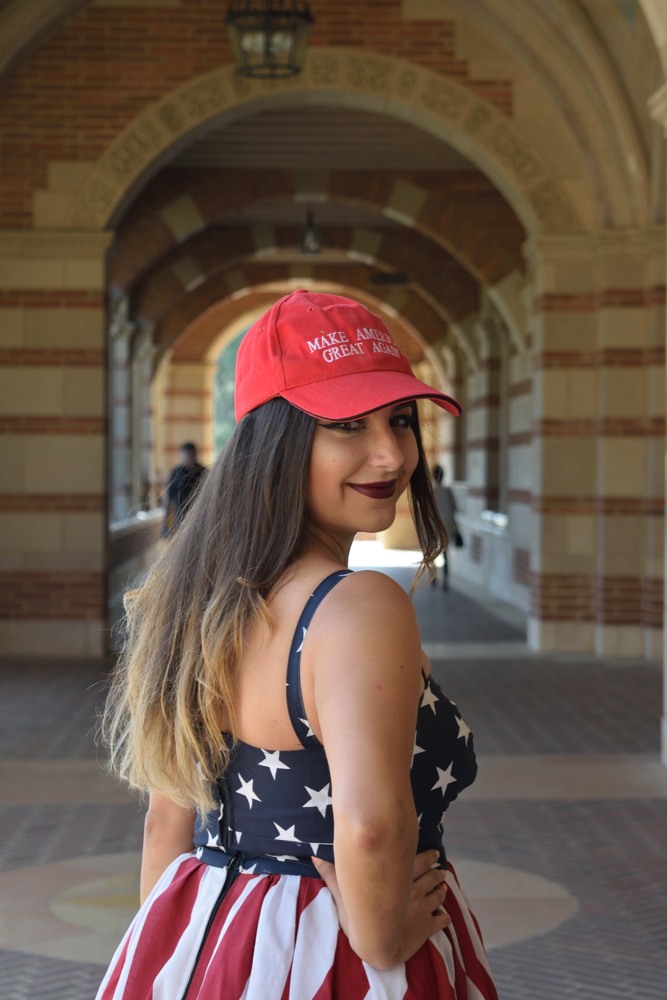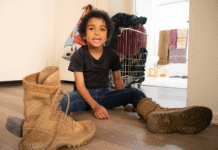
Swarms of college students blend together, holding their textbooks, coffee cups and laptops, consumed in thought as they hurry to and from class on the University of California, Los Angeles campus. A bright red hat upon a confident young woman’s head makes a statement, standing out among the crowd.
The white capital letters embroidered on the hat read “Make America Great Again.”
Proudly wearing the hat one month into Donald Trump’s presidency is Haley Nieves, a passionate third-year political science and international development studies student at UCLA. She is a member of Bruin Republicans, a club that’s part of California College Republicans for right-of-center college students to discuss the political frontier of the United States.
Nieves joined the club during her freshman year after realizing that she wanted to advocate for conservatives with like-minded individuals. Within weeks of attending several meetings, she was elected as the club’s outreach director and later the external vice president.
“I saw a need for conservatives to be actively organized on campus,” Nieves says. “I wanted to help stand out against the leftist orthodoxy on campus, because it is very prevalent.”
She now serves as the Los Angeles Region Vice Chair of California College Republicans and works as an intern for the Republican Party of Los Angeles.
Nieves says that she and other members of Bruin Republicans are vocal about their conservative views, but some conservative students at UCLA feel the need to conceal their beliefs on a liberal-leaning campus in a Democratic city.
College-aged Republicans are a minority in California. According to the Public Policy Institute of California, only 9 percent of Republicans in the state are likely to be between the ages of 18 and 34, while 55 percent are more likely to be older than 55 years old.
“There can be instances of discrimination,” Nieves says. “There is a social stigma of being an individual who is even slightly right-of-center, independent, conservative or libertarian on campus.”
Nieves believes that one of the reasons these students are uncomfortable sharing their views is that many of their peers and professors base their opinions of Republican college students off stereotypes.
“I think a lot of the stereotypes of Republicans on college campuses in general is that we’ve only come to these positions or that we only caucus with the Republican party, because our parents raised us to be that way or because we come from a red area,” she says.
Nieves was raised by centrist parents, and she says that as a teen, she identified as a social justice warrior. At 16, she became a non-denominational Christian and began to develop socially conservative views. When she was in high school, two of her teachers shaped some of her fiscally conservative beliefs, but she has also formed opinions through research.
“I’m very solidified in my opinions and constitutionalized conservative positions,” Nieves says. “I can defend all of my views outside of my religious convictions. Simultaneously, I can be pro-life because I’m a Christian and pro-life for bioethical reasons and for reasons I can derive from philosophy and understandings of natural law.”
Though Nieves and her parents have different political views, she says that her family regularly engages in respectful political discussions.
Her experiences with fellow students have not been as peaceful as the ones with her parents. Nieves believes that UCLA is a tolerant campus compared to other universities in California, but she says there have been times that she has been harassed by students on campus and around the city.
Nieves says that while she was taking down a memorial that Bruin Republicans put together during her second year, a student called her a racist and hit her over the head.
She also says that on Nov. 9, 2016, the day after Trump won the presidential election, she came to class wearing Trump campaign gear to celebrate his victory and she was confronted by another student at a bus stop on her way back to her apartment.
“He proceeded to get on the bus, take pictures of me, follow me back to my apartment, shout at me the whole way there and call me whatever names he would like to think of,” Nieves says.
Nieves says that the student recognized her from a viral photo of her holding a sign at a Black Lives Matter protest at the University of California, Irvine. Her sign had the phrase “black lives don’t matter to Black Lives Matter” written on it, but the photo was cropped to just show the first part of the phrase, “black lives don’t matter,” incorrectly portraying her message. However, she says the student on the bus refused to hear her side of the story before making a judgment.
The hostility that Nieves has encountered has come from students who are not members of the political organizations. She says that Bruin Republicans have a healthy relationship with Bruin Democrats, another political club on campus.
“Our clubs are very conductive for engaging political discussion,” Nieves says. “But there can be some animosity from other Republican and Democratic students on campus.”
Internal Vice President of Bruin Republicans Julia Nista says that some of her more liberal friends have chosen to distance themselves from her because of her conservative views.
“I had a good friend since my freshman year, and over the summer she told me she couldn’t be friends with me anymore because of my political beliefs,” Nista says. “It was really unfortunate.”
Nista says she has also felt silenced as a Republican in some of her classes.
“The teachers assistants are where it’s hard because you can’t openly discuss your political opinions,” Nista says. “They could call you out and potentially grade you down. When it comes to discussions, it’s sometimes better to refrain from talking.”
Nista also says that when she discusses her political views in class, most of her peers are surprised that she holds those beliefs.
Pierce College political science professor Denise Robb has noticed the impact that the 2016 election had on college students in and out of the classroom.
“The election was very traumatic for many of my students, just because of the extreme nature of the candidate,” Robb says. “Many of them were sobbing the day after the election.”
Robb says that she can see a difference in the attitudes of her students as a result of the election.
“The positive thing about Trump’s election is that now students seem to really care about politics for the first time,” Robb says. “It’s really starting to hit home for a lot of them.”
Nieves, who plans on moving to Washington, D.C. after she graduates this year, believed Trump performed “exceptionally well” in his first month in office.
“I think Trump is one of the only presidents who actually intends on following through with all of the promises he made throughout his campaign,” Nieves says.
Nieves hopes to see the California College Republicans and other Republican organizations grow in size, quality and prominence on campuses.
“Because we are a minority, it is easy to feel like you are alone as a conservative on a college campus,” Nieves says. “We are around other people who are just as energized that it empowers you to go on and do the same.”
In May, 100 days after Trump has been in office, Nieves says that she no longer feels the same confidence in his administration as she previously did. She says that a lot of her frustration started with Trump’s interference in Syria.
“In general, I have been very disappointed with the performance of the administration,” Nieves says. “I believe that Trump has completely turned to the establishment and away from all of the voters that he made promises to.”
Nieves says she doesn’t think that Trump will go back to maintaining his original promises, but she hopes that she’s wrong.
“Honestly, I’m not very hopeful at this point,” she says. “But I would like to be pleasantly surprised.”



